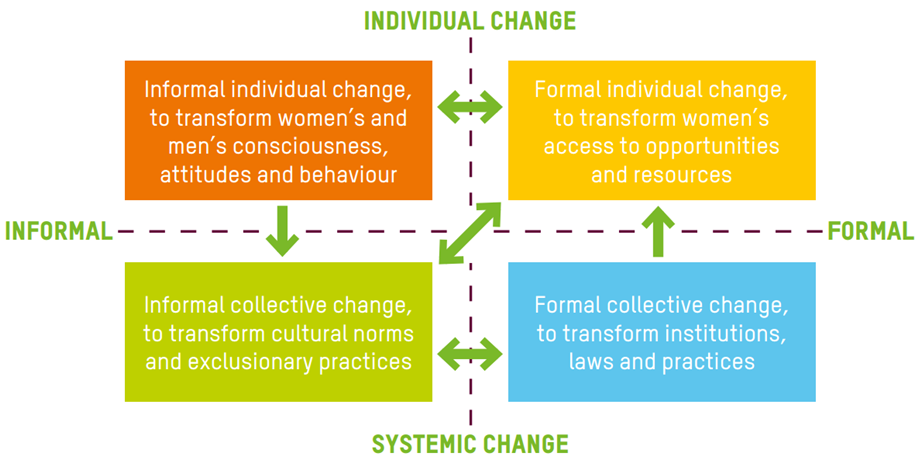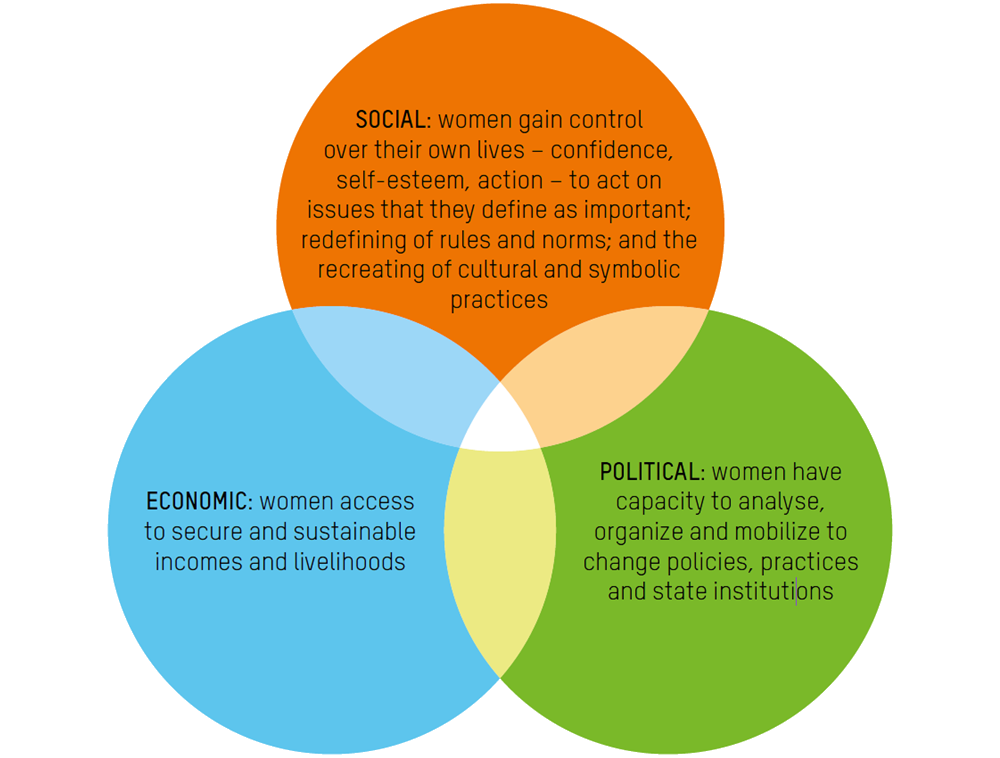Oxfam’s thinking and approach to WEE
Oxfam asserts that effective economic empowerment for women occurs when women enjoy their rights to control and benefit from resources, assets, income and their own time, and when they have the ability to manage risk and improve their economic status and wellbeing. However, for WEE to translate into meaningful empowerment, women must also have the autonomy and self-belief to make changes in their own lives, including having the agency and power to organize and influence decision making, while enjoying equal rights to men and freedom from violence.
Oxfam’s thinking and approach to WEE is rights-based, holistic, systemic, and aims to challenge mainstream economic thinking which systematically discriminates against women. In addition to important issues of decent work and of control over assets and material resources, it is also about the choices women make over their time, and requires social and political interventions.
Rights-based: Women should be able to enjoy their human rights on an equal footage as men
Holistic: Holistic: Sustainable WEE requires social, political and personal empowerment
Systemic: Systemic: We address changes required at systemic level to achieve WEE at scale
transformative approach to achieving women’s rights
Sustainable progress and widespread impact on WEE requires working at many levels simultaneously – individual, household, community, and national. Change at an individual level is unsustainable without positive change in organizations and government policy. Likewise, pro-women economic development policy may not be effective without working to address changes in communities and households.
Oxfam’s transformative approach to achieving women’s rights, whether in economic, political or social spheres, requires changes at both the individual level (both of women and men) as well as systemic levels. Change is also required at both the informal level in rules and practices and the formal level in terms of institutional rules, laws and governmental policies. This model supports the design of effective theories of change by identifying the different pathways of change that need to be considered.

WEE and wider women’s empowerment
Systemic change to remove the barriers to women’s rights requires understanding the interactions between different parts of a system and how together they effect change, rather than trying to understand specific components in isolation. Transformational and sustainable change for women and girls means analysing the complex mix of social, political and economic systems they are immersed in – as well as the actors involved and their relations of power – through the lens of gender.

The economic sphere is one of several entry points through which women can become empowered. The most appropriate ‘entry point(s)’ to women’s broader empowerment depends on the context. Given the interconnected nature of women’s empowerment across social, political and economic spheres, in many cases, addressing social and political empowerment provide the best entry point for challenging the social norms and cultural practices that prevent women’s full participation in economic activities.
Fundamental principles for achieving sustainable WEE
This section proposes a series of basic principles to apply in programme design, and which constitute good practice in programme implementation.
Increase the voice of women in the household, in communities, in economic institutions and in political spaces
Women within these groups can become spokespeople to promote women’s strategic interests and ensure that women’s issues and proposals are properly addressed.
Take a systems approach to overturn the barriers to realizing women’s economic rights
Economic progress is dependent on a complex web of social, economic and political factors that interact with each other. Understanding the role of these issues is critical to design effective interventions and reduce risks of negative impacts on women.
Harness multiple entry points to ensure meaningful WEE and support women’s empowerment more broadly
While partners and donors may often focus solely on creating and supporting women’s economic activities, Oxfam understands that actions on social and political dimensions are critical for WEE to be sustainable and meaningful.
Build partnerships that embed ownership in local systems
Women’s empowerment requires focusing on specific opportunities that are feasible with specific groups of women and the context, and building partnerships across a range of actors to advance those.
Strengthen internal capacity to ensure programme quality
Implementing WEE initiatives requires multidisciplinary teams to develop a basic understanding of the barriers that prevent women from becoming fully empowered, and to be able to tap into available resources and expertise throughout the confederation.
Main themes of Oxfam’s programmes
Currently Oxfam works in over 40 countries to promote women’s economic activities through diverse approaches that often include a combination of skills training, strengthening women’s control over assets, promoting women’s collective action in markets, business development and policy advocacy. Oxfam’s commitment to gender justice also includes programmes which target barriers to women’s rights more broadly, such as violence against women, social norms, unpaid care work, and lack of gender awareness and leadership, which impact on WEE.
The different approaches to WEE fall under several overarching themes, which include:
Inclusive market systems development
We aim to shift power in markets and promote WEE by addressing power imbalances along the value chain.
Challenging social norms and improving social inclusion
We convene stakeholders to address the social norms that dictate and freeze the expected roles of men and women.
Community savings groups and access to finance
This work focuses on increasing women’s and communities’ access to adapted financial Services.
Reducing and redistributing Unpaid care work
We gather context-specific evidence to advocate for greater investments in infrastructure and care services.
MEASURING WEE
Our M&E Framework is structured around 21 ‘Outcome Areas’ articulated around 3 domains:
- The personal domain: women’s individual knowledge, mobility, attitudes and beliefs, and self-perception
- The relational domain: attitudes and norms of people within women’s lives and enterprises they interact with
- The environmental domain: the broader social and political structures in the public space which impact women’s empowerment
